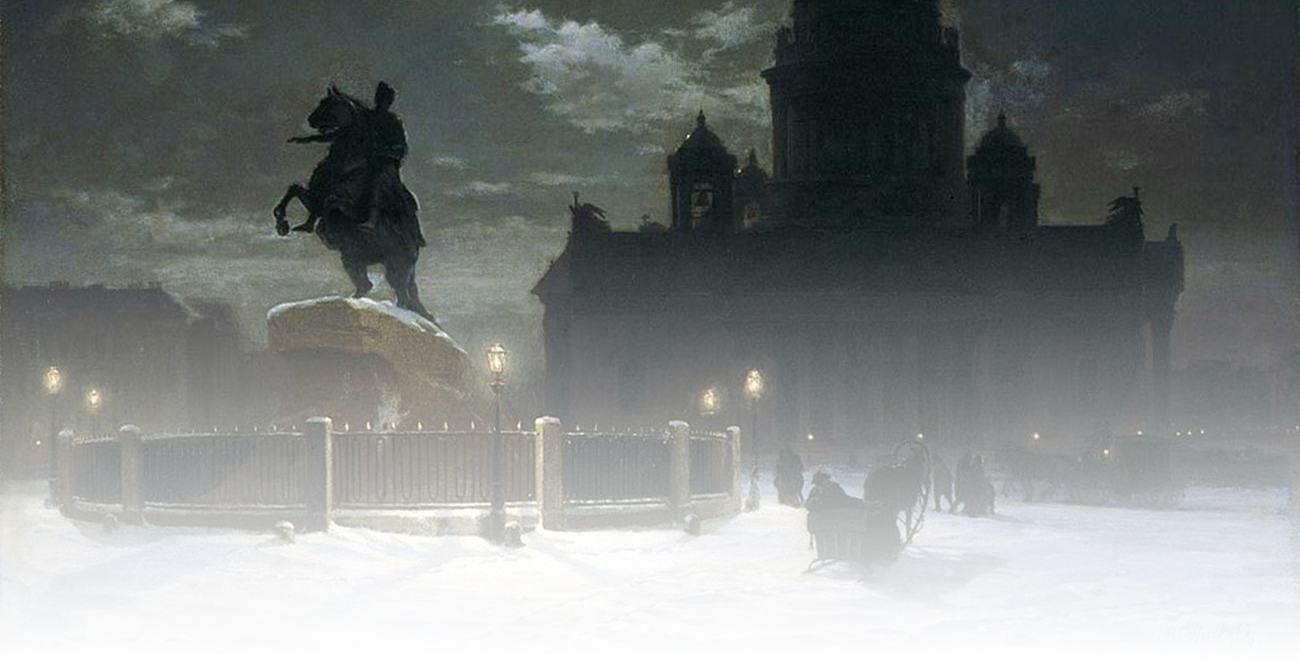Introduction
White Nights is an anonymized, asynchronous, remote text-based TTRPG, set in Saint Petersburg in the mid-19th century. The players each take on the role of a Russian aristocrat as they navigate soirees, balls, and other events while in pursuit of a good marriage (whether that means marrying for money, social standing, or perhaps even for love).
The game is Anonymized, meaning that players do not know which other characters are controlled by other players and which are controlled by the GM. It is even possible that they may not know who else other than themselves and the GM is even playing the game. All direct player interaction occurs between the player and the GM, with the GM then weaving together the input from the different players into the story, providing updates on the story as it progresses, and seeking further input from players in response.
The game is Asynchronous, meaning that rather than having scheduled game sessions once a week for a few hours, the game happens continuously and intermittently at whatever pace the GM's and players' free time allows. It's possible that if all players are online and available at the same time, the game could progress at whatever maximum speed the GM is able to manage everything. On the other hand though, the game might periodically be held up for days or weeks while waiting for input from certain players.
The game is Remote and Text-Based, meaning that gameplay occurs entirely online or through messages rather than through in-person conversation or voice chats. Players are only able to talk to each other and to non-player characters indirectly by talking with the GM, or through written notes or letters.
Setup

Characters
Each player creates an upper-class Russian character using the character creation rules (described in a later section), generating their Attributes, choosing a Background, and brainstorming some rough ideas about their backstory and goals. The GM, taking into account the characters that the players have created, also makes up some NPC aristocrats to populate their social circle with.
Relationships
While it is possible for a player character to be a fresh new arrival to the Petersburg high society scene, in most cases players will already have some Relationships with some of the other NPCs and PCs. Players can suggest possible relationships for their characters, or the GM can suggest relationships to them. In either case, the GM takes extra care while arranging relationships to avoid revealing the identity of the players to each other, and to avoid distinguishing between PCs and NPCs.

Relationships might take the form of blood or affinity relations, close childhood friends, longtime rivals, business or military acquaintances, or something as casual as the two characters having met and talked while on the train recently. Whatever the case, the form of the relationship is known to both participants and to the other characters who know them. Additionally, players also tell the GM how they feel privately about the other characters. Ideally, the game's characters will have a relatively wide but tightly knit web of connections so that new NPCs don't have to be continually thrown into the mix in order to move the story forward.
Once the GM is satisfied with the finished social web and everyone's relationships and immediate family have all been fleshed out, players finalize the details of their characters and add in any additional relations for their character that they feel are necessary, with the understanding that any new NPCs created and added in by the player at this stage will not be significantly connected with any other characters in the social web. Players also set out their goals for the story, either by naming characters from the social web that they would like to marry, or else by at least prioritizing the sorts of things they seek to gain from marriage. Players can have other related goals as well, such as securing a good marriage for a friend or family member, embarrassing or exposing a rival, or getting into the good graces of an important personage within the social web.
Prologue
Once all the characters and their relationships have been created and introduced, the GM takes all the information together, along with any details on the setting and any recent or upcoming events in Petersburg society that might motivate the plot, and summarizes it into a Prologue for the story. This Prologue, along with a complete and detailed List of Characters (including Attributes, Backgrounds, and publicly-known Relationships, but NOT including whether each character is a PC or NPC) is then shared publicly with all players.
Game Format

Chapters
Following the publication of the Prologue, the game is organized into Chapters, with each chapter corresponding to a major event in the lives of the members of the social web, along with any minor related events that occur before or after. A Chapter might consist of a dinner party, a ball, a short stay at a country villa or spa town, a wedding, or any other situation that causes the different members of the social web to gather together or visit each other. The event could be something determined by the GM or done on the initiative of an NPC, or it could be something driven by a PC, either at the player's suggestion or at the GM's.
As the event unfolds, the GM prompts each individual player for input on how their character acts and how they respond to the actions of other characters, and keeps the player updated on what their character has seen and experienced. After the conclusion of the event and any other immediate character actions, the GM summarizes all the non-secret details of the event into a written Chapter and, as with the Prologue and List of Characters, shares the Chapter publicly with all players. If a player learns anything new from reading the Chapter that their character didn't directly witness, it can be assumed that they learned those details later as gossip.
Communication
Communication from the GM to the players thus takes two distinct forms: (1) publicly posted information such as the Prologue, List of Characters, and Chapters, which is the same for all players, and (2) private messages to individual players, telling them things that not every character would know, or telling them details specific to their character and prompting them for a response as the events unfold. In addition to publishing finished Chapters, it is also possible for the GM to post updates mid-Chapter, when something important happens mid-event that all characters would be aware of (such as the arrival or departure of a new guest, or a heated argument or scandal occurring where anyone can see it).

Players, on the other hand, are only ever able to communicate privately with the GM. If a player wishes to talk with or give a message to some other character, they do so through the GM, whether that's by telling the GM what it is they want to communicate, or by writing a note or letter to be delivered in-game to the other character. (If the game is being hosted through something like a Discord server, or if the players know and see each other in real life, it is highly encouraged that they only discuss the game with each other in ways that preserve their own and the other players' anonymity.)
Though the game is asynchronous, in some cases character initiative may be determined by which players are able to message the GM first. For example, if two different players want to be the first to ask a certain character for a dance, and there aren't other circumstances that would help determine the outcome, then whichever player says so to the GM first will likely be the one who succeeds (though if an issue is not simply a question of timing, it may constitute a Conflict, as is described in a later section).
Conclusion
The game continues Chapter by Chapter, until most or all of the PCs are married or have reached some other end to their stories, or until the game has otherwise reached some natural conclusion. Once things have concluded to the GM's and players' satisfaction, the GM asks for any last minute character actions and/or future plans, writes and publishes an Epilogue, and ends the game. After the end of the game, players are of course free to reveal themselves and their characters and to talk with each other about any secrets and schemes.
